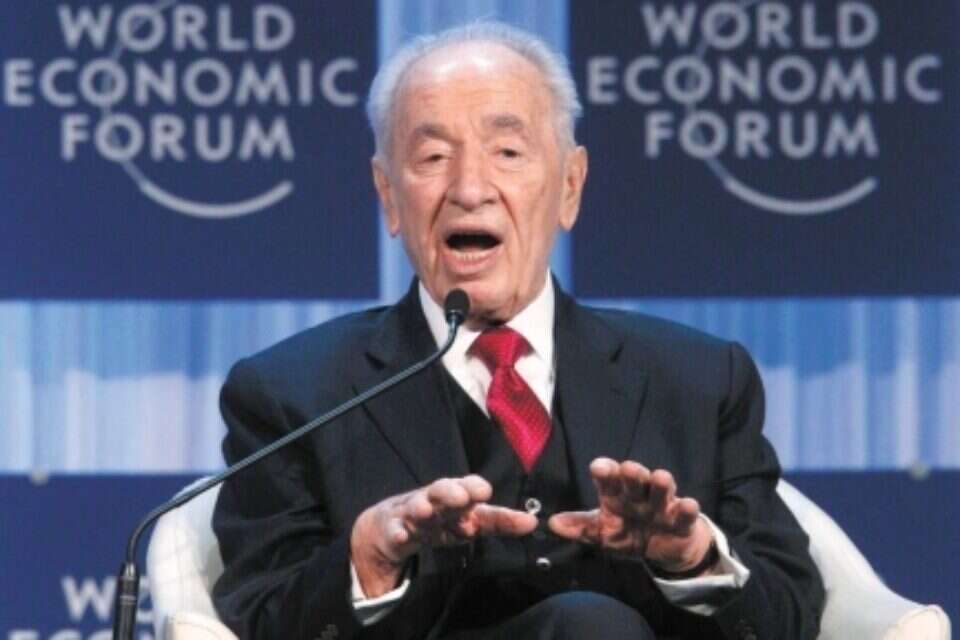The Iranian people must be encouraged to return to the streets and rise up against their government, President Shimon Peres said Thursday, calling the Islamic Republic "the most corrupt country in the world." "The world needs to give the Iranian people hope that they can succeed in toppling the regime," Peres said, speaking at the World Economic Forum in Davos, Switzerland. "Iran is the most corrupt country in the world," Peres continued. "People are hanged there without trial. They have no respect for human rights. The steps that the United States and Europe have taken [against Iran] are good, but not enough. We need to end Iranian intervention in the Middle East." Peres' comments come days after the EU announced it would embargo Iranian oil and sanction its central bank, in hopes of forcing Iran to abide by international commitments regarding its nuclear program, which Israel and the West believe is intended for military purposes. Iran insists its nuclear program is solely for civilian purposes. Also in Davos, Israeli Defense Minister Ehud Barak said the world must quickly stop Iran from reaching the point where even a "surgical" military strike could not block it from obtaining nuclear weapons. The situation is "urgent, because the Iranians are deliberately drifting into what we call an immunity zone where practically no surgical operation could block them," Barak told reporters on Friday.
"It is the West that needs Iran and the Iranian nation will not lose from the sanctions," Iranian President Mahmoud Ahmadinejad said in his first public comments on the issue since the EU's 27 member states agreed to the ban on Monday.
"There was a time when 90 percent of our trade was with the Europeans. It has now dropped to 10%. We didn't call for this. Cut it [trade] and let's see who will incur the loss," he said in excerpts of a speech broadcast on state radio.
Tehran has said the EU's six-month phase-in for the ban indicates its difficulties in cutting Iranian oil supplied as it faces unprecedented economic uncertainties due to a debt crisis. The EU is Iran's second biggest oil customer after China.
"All European countries that made Iran the target of their sanctions will not be able to buy even one drop of oil from Iran and oil taps will be turned off to them so that they will not play with fire again," lawmaker Nasser Soudani told the semi-official Mehr news agency.
Meanwhile, some senior Israeli decision-makers have reportedly come to the conclusion that Iran is partly bluffing about the degree to which it would retaliate in the event of a military strike against its nuclear weapons program.
According to a New York Times report published on Friday, senior Israeli leaders, basing their views on intelligence estimates that are backed by academic studies, have begun questioning the assumption that such a strike would unleash a regional or global war, widespread acts of terrorism or increasingly costly oil prices. The view that Iran is bluffing to some degree, according to The New York Times, plays an important role in Israels calculation of whether to ultimately strike Iran.
Former Chief of General Staff Lt. Gen. (res.) Gabi Ashkenazi, speaking on Thursday at a forum of the Institute for National Security Studies (INSS) in Tel Aviv, also touched on the Iranian nuclear weapons issue, saying, "In my opinion, the current strategy is the correct one. Everyone should keep the options on the table. When the moment comes Israel will have to rely on itself."
According to Ashkenazi, "Everything that can be done must be done under the radar, in addition to painful, paralyzing sanctions while at the same time putting a reliable military option on the table, one that you are willing to implement." Ashkenazi added, "It is possible the Iranians will make a mistake. They may block the Strait of Hormuz; in my opinion that would be a strategic blunder."
Ahmadinejad, at the same time, is still standing firm in his claim that his country will bounce back from any sanctions.
On Thursday, however, the Iranian leader joined the chorus of Iranian officials who said Tehran should return to a new round of talks with the five permanent U.N. Security Council members plus Germany, but suggested that Tehran's foes will have to make compromises to prevent negotiations from again collapsing in stalemate.
Iran's insistence that it will never give up uranium enrichment the process that makes material for reactors as well as weapons scuttled negotiations a year ago and still looms as a potential deal-breaker even as tougher Western sanctions target Iran's critical oil exports.
Ahmadinejad, the highest-ranking official so far to offer to return to negotiations, did not elaborate about a potential timetable or venue.
Meanwhile, U.S. Joint Chiefs of Staff Chairman Gen. Martin Dempsey said Thursday, "The Israelis see the [Iranian] threat differently. For them it's an existential threat."
Also on Thursday, TIME magazine quoted an Israeli security official saying that last autumn, a senior IDF official told the Israeli cabinet, "The army does not have the capability to significantly damage the Iranian nuclear program."
טעינו? נתקן! אם מצאתם טעות בכתבה, נשמח שתשתפו אותנו